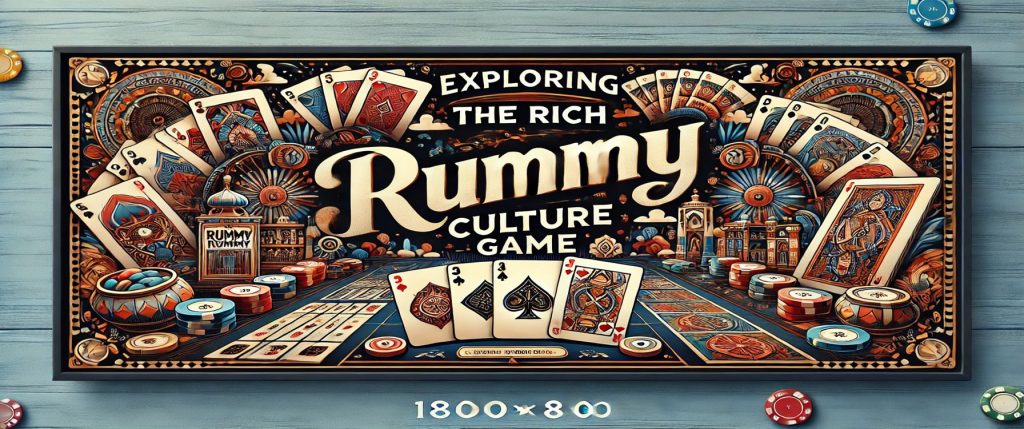
The Complete Guide to Rummy: History, Gameplay, and Cultural Impact The card game rummy, which has enthralled players for centuries, has a rich and diverse history that dates back to the early 1800s. Although the precise origins of rummy are not entirely clear, it is generally accepted that it developed from earlier card games like “Concentration” & “Pinochle.”. Originally played with tiles in China, the game is believed to have spread to Europe, especially in the form of “Rum,” which gained popularity in the US. With several regional variations, such as Gin Rummy & Indian Rummy, rummy had become a mainstay in American homes by the late 1800s. This development shows how flexible the game is and how well it connects with a variety of cultural backgrounds.
Rummy experienced substantial changes as it traveled across continents, which helped to sustain its appeal over time. As the game’s mechanics were improved over time, a plethora of variations that catered to various player preferences emerged. As an example, Elwood T.
created Gin Rummy in 1909. A quicker version was introduced by Baker, emphasizing strategy and skill over chance. A popular game among players in South Asia, Indian Rummy combined aspects of traditional Indian card games. The goal of forming sets and runs from the dealt cards is the common element among the many variations of rummy that exist today, each with its own set of rules and subtleties. This intricate history not only demonstrates how rummy has changed over time, but also how popular it is everywhere.
It is crucial for both novices & experienced players wishing to improve their tactics to comprehend the rummy rules & gameplay. Fundamentally, two to six players play rummy using a standard deck of cards. The aim is to create legitimate runs (three or more consecutive cards of the same suit) and sets (three or four cards of the same rank). After drawing a card from the discard pile or the stockpile, each player discards one card at the conclusion of their turn. The round is over when one player successfully melds every card they have into sets & runs that are legal.
For novices, learning the fundamentals is only the first step; creating winning strategies can greatly improve gameplay. One important tactic is to observe the cards that opponents discard, as this can reveal information about their hands and possible melds. Also, by retaining cards that are versatile and can be used in a variety of ways, players should try to keep their options open. If another player goes out, skilled players frequently use sophisticated strategies like bluffing or purposefully discarding high-point cards to reduce their score. Players can improve their rummy experience and raise their winnings by fusing strategic thinking with an understanding of the rules.
Rummy’s appeal on a global scale is evidence of its adaptability and cultural significance in various locales. Rummy is not just a recreational game in nations like India; it is a beloved custom that is frequently played at festivals and family get-togethers. Particular rules and scoring schemes that take into account regional tastes and customs are incorporated into the Indian version of rummy.
In a similar vein, variations such as Gin Rummy & Canasta have established themselves as social mainstays in Western nations & are frequently connected to friendly competition between friends & family. Because of its versatility, rummy is a popular game across cultural boundaries & is played all over the world. Another factor contributing to the game’s broad appeal is its accessibility; rummy can be played in a variety of settings, from informal home games to formal tournaments, and it requires very little equipment. Also, rummy has been made accessible to a new generation of players through the growth of online gaming platforms, which have enabled them to interact with people all over the world.
The game’s reach has increased thanks to this digital transformation, which has also created communities where players can exchange strategies, advice, and personal stories. Because of this, rummy is still a popular social game that unites people from all walks of life. Over the years, rummy’s competitive aspect has grown significantly, with multiple tournaments and championships taking place all over the world. Professional players compete for titles and cash prizes at these events, as do amateur enthusiasts. Players’ abilities & tactics are put to the test over several rounds in major tournaments, which frequently have demanding formats.
To illustrate the competitive nature of the game on a global scale, the World Rummy Championship, for example, has grown into a prestigious event that features elite talent from different nations. Within the rummy community, professional players have become celebrities & frequently share their knowledge through live streaming and tutorials. These people encourage aspiring players to improve their abilities in addition to showcasing sophisticated techniques. Because players can now compete virtually from the comfort of their homes thanks to the growth of online platforms, this spirit of competition has been further stoked. Players are encouraged to improve their gameplay while also developing a sense of camaraderie as rummy develops as a competitive sport.
More than just a card game, rummy is a social activity that strengthens bonds between family members and friends. Rummy gives people a chance to connect over common experiences and healthy competition, whether it is played at home during get-togethers or in specialized clubs. Due to its inherent simplicity, players of all ages can participate, which makes it a great option for informal get-togethers or family game nights. Rummy turns into a game that helps players laugh and bond as they joke around and plan their next moves.
Online communities have grown in popularity recently as a continuation of this social element, enabling players to interact with people who are as passionate about rummy as they are. Regardless of location, players can compete against one another in live tournaments and discussion forums provided by virtual platforms. In addition to improving the gaming experience, these online exchanges help players who might never meet in person form enduring friendships.
Rummy is still a beloved game that unites people in a variety of contexts as it continues to evolve to fit contemporary social dynamics. Rummy’s Cultural Importance. The influence of rummy goes well beyond the gaming table; it frequently appears in literature, movies, & other entertainment mediums. In a variety of stories, the game frequently represents social interaction, strategy, and guile. For example, characters in classic novels may play rummy to show their relationships or conflicts. Rummy in movies and literature.
In a similar vein, intense rummy games may be portrayed in movies as crucial scenes that drive plot points or reveal character traits. This portrayal emphasizes how rummy functions as a cultural icon that appeals to viewers of various media. Rummy’s continued popularity in popular culture also attests to its status as a timeless game that appeals to people of all ages. The Durable Allure of Rummy.
Rummy continues to captivate audiences all over the world as new adaptations appear, whether in the form of contemporary literature or films. Its representation in popular culture emphasizes its versatility in reflecting changing societal values and trends, in addition to reaffirming its importance as a social activity. An enduring hobby. Rummy’s enduring appeal is demonstrated by its ability to cut across generations & media.
Rummy is a beloved game that is still played by people all over the world, despite its evolution as a cultural icon that reflects shifting social trends and values. Playing games like rummy has many mental & emotional advantages that improve wellbeing in general. Rummy demands fast decision-making, strategic planning, and critical thinking abilities—all of which improve cognitive function and engage mental faculties. Regular card game play has been shown to enhance memory retention & problem-solving skills, making it a great pastime for people who want to maintain mental acuity as they age.
Playing rummy can have positive emotional effects in addition to cognitive ones. Gaming’s social interactions help people connect with one another & lessen feelings of isolation and loneliness. Also, when players win games or successfully implement strategies, the excitement of competition can increase self-esteem and give them a sense of accomplishment. Rummy is a holistic activity that supports mental & emotional well-being by fusing social interaction with mental stimulation. Several new developments suggest that rummy, a popular card game, will survive in an increasingly digital world in the years to come.
Players can now access rummy at any time and from any location thanks to the proliferation of mobile gaming applications. These platforms frequently include cutting-edge elements that improve the overall gaming experience, like social networking features, interactive tutorials, & live tournaments. Also, rummy play and experience are likely to change in the years to come due to technological advancements.
Players may be able to play realistic rummy games with friends from all over the world in immersive virtual reality (VR) gaming environments. Also, AI could be used to create more intelligent practice opponents or even provide individualized coaching for aspiring athletes. While maintaining rummy’s fundamental qualities as a popular card game that unites people from all walks of life, these technologies will surely have an impact on how future generations play the game. In summary, rummy’s reputation as one of the most beloved card games in the world is a result of its lengthy history, variety of gameplay mechanics, appeal to players worldwide, competitive environment, social significance, cultural representation, health advantages, and bright future.
Rummy is a timeless game that appeals to people of all ages, whether it is played relaxedly with friends or competitively on a global scale.





